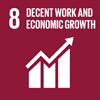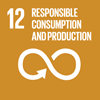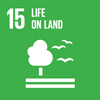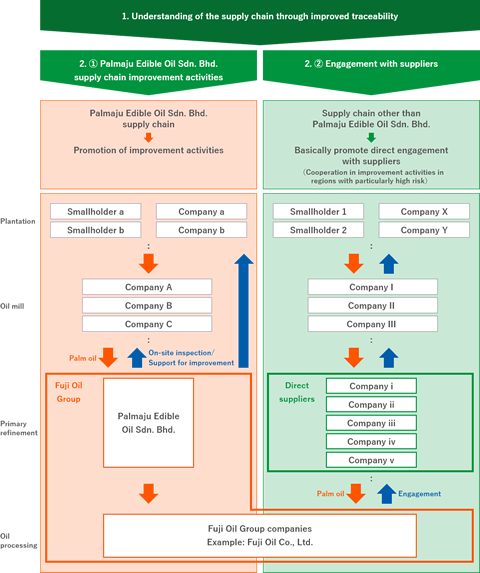Sustainable Procurement of Palm Oil
Focus SDGs
Management information
Relation between themes and business activities
Palm oil is oil extracted from the fruit of the oil palm, which grows in tropical regions like Southeast Asia. Palm oil is easier to process and has a higher yield per unit area than other vegetable oils. For this reason, palm oil is used in a wide range of applications, from foods to chemical products, and has the largest production volume among vegetable oil materials in the world. However, there are concerns about environmental problems caused by plantation development and human rights issues, such as child labor and forced labor. The Fuji Oil Group procures palm oil, mainly from plantations in Malaysia and Indonesia, as key raw material for businesses like the vegetable fats and oils business. We contribute to the sustainable procurement of palm oil by working with suppliers to reduce and eliminate risks in the supply chain.

*1 More than 1,300 oil mills registered in July–December 2019 oil mill list
*2 As of May 31, 2020
Basic approach
Responsible Palm Oil Sourcing Policy
In March 2016, we formulated and announced Fuji Oil Group’s Responsible Palm Oil Sourcing Policy. In this Policy, we commit to procuring palm oil produced in a responsible manner from suppliers who respect people and the global environment. We conduct our procurement activities in line with this Policy and in cooperation with our stakeholders. We will continue to promote responsible palm oil procurement to ensure that palm oil becomes a sustainable raw material.
The Responsible Palm Oil Sourcing Policy PDF(1.62MB)
Promotion system
We promote initiatives on sustainable procurement of palm oil under the supervision of the Chief Strategy Officer (CSO). Moreover, the ESG Committee*, which is an advisory body to the Board of Directors, confirms the progress and results of these initiatives as a priority theme for ESG management.
* Refer to the URL below for details of the ESG Committee.
https://www.fujioilholdings.com/en/csr/approach/
Objectives / Results
FY 2019 objectives
- Improve traceability to palm oil mills (100% by 2020)
- Promote supply chain improvement activities for Palmaju Edible Oil Sdn. Bhd. (Malaysia)
- Promote response to problems in the supply chain (grievances)
FY 2019 results
The FY 2019 results against the above objectives are:
- The traceability to palm oil mills reached 100%.
- A workshop was held for suppliers of Palmaju Edible Oil Sdn. Bhd. (Malaysia) (held once, with 48 companies participating).
- Promotion of engagement with suppliers of Palmaju Edible Oil Sdn. Bhd. (Malaysia) through company visits (4 companies).
- Response to 101 grievances by the end of March 2020.* (In 73 cases, improvements were confirmed, or transactions were suspended).
* Refer to the "Grievance List" at the following URL for details of the latest responses to grievances.
https://www.fujioilholdings.com/en/csr/grievance_mechanism/
Next Step
We are committed to the sustainable procurement of palm oil. This translates into a continuous promotion of group-wide efforts to improve traceability to palm oil mills and conduct supply chain improvement activities. Our aim is to achieve no deforestation, no peatland development, and no exploitation as stated in our Responsible Palm Oil Sourcing Policy. In June 2020, we established mid- to long-term goals for the procurement of sustainable palm oil. In FY 2020, we aim for 100% traceability to palm oil mills and 60% traceability to plantations (52% achieved by FY 2019) based on these mid- to long-term goals. To this end, we plan to promote the introduction of a “Suspension (transaction suspension) and Engagement Protocol” as part of the supply chain improvement activities and of the grievance mechanism.
Mid- to long-term goals
In March 2016, we introduced the Responsible Palm Oil Sourcing Policy with an initial target of 100% traceability to palm oil mills by 2020. Since then, we have worked to improve traceability and the supply chain and to promote engagement with suppliers. Since traceability to palm oil mills reached 100% in FY 2019, we established new mid- to long-term goals with the aim of further enhancing supply chain management and realizing the Responsible Palm Oil Sourcing Policy.
- Improve traceability to oil palm plantations (100% by 2030)
- Implement the Labor Transformation Program (LTP) at 100 % of the suppliers of Palmaju Edible Oil Sdn. Bhd. (Malaysia), by 2025. This is the Group's primary refining company.
* Refer to the URL below for details of the mid- to long-term goals.
https://www.fujioilholdings.com/en/news/2020/1198318_2692.html
Specific initiatives
Overview of initiatives to achieve the policy
![]()
| Initiatives | Aim |
|---|---|
| 1.UNIFUJI | Strengthening the capability to supply sustainable palm oil |
| 2.Traceability improvement | Understanding the supply chain |
| 3.Supply chain improvement activities | Reducing risks within the supply chain, in cooperation with suppliers |
| 4.Grievance mechanism | Early discovery and improvement of problems within the supply chain |
| 5.Supply of RSPO-certified oil | Spread of palm oil produced in a sustainable manner |
| 6.Cooperation with academia and industry | Contributing to the promotion of initiatives throughout the industry |
UNIFUJI
Promoting sustainable palm oil sourcing and responsible product supply to customers and consumers are important themes of the Fuji Oil Group's business strategy. UNIFUJI SDN. BHD. is a joint venture with UNITED PLANTATIONS BHD., which is a partner that shares our intentions regarding sustainable palm oil. Our joint venture partner UNITED PLANTATIONS is the world's first producer of RSPO-certified oil and conducts sustainable plantation management in consideration with the human rights of its workers and the environment. UNIFUJI, whose plant started operations in FY 2018, procures high-quality and sustainable palm oil from UNITED PLANTATIONS and produces high-value-added palm oil products, using fractionation technology, which is a strength of the Fuji Oil Group. In FY 2019, UNIFUJI handled approximately 70,000 tons of RSPO-certified oil. UNIFUJI's plant is located at the plantation and uses energy generated from biomass and wastewater.
Understanding the supply chain through improved traceability
Identifying the production region of the palm oil purchased and used by the Fuji Oil Group is important to improve the supply chain. By setting an initial target of achieving full traceability* from plantation to palm oil mill by 2020, we became a member of the non-profit organization Earthworm Foundation. Since then, we work with our suppliers to improve traceability.
The Fuji Oil Group monitors the progress on the traceability of the palm oil we procure from oil mills through a traceability score (%). Although the score varies by region, the Group achieved a level of 100% in the second half of FY 2019. This is due to our continuous effort to strengthen the communication with palm oil suppliers. More than 1,300 oil mills in the supply chain were registered on the FUJI OIL GROUP Palm Oil Mill List*2 during the second half of FY 2019.
* Traceability: The act of, and framework for making apparent (i.e. traceable) the production history and distribution routes of food products to ensure their safety.
*2 Refer to the URL below for details of the Palm Oil Mill List.
https://www.fujioilholdings.com/pdf/en/csr/supplychain_database/h2_2019_mill_list.pdf
Supply chain improvement activities
Based on our Sourcing Policy, we conduct supply chain improvement activities to resolve environmental and human rights issues at palm oil production sites (plantations). The Fuji Oil Group roughly divides the supply chain into the types, ① and ②, to promote improvement activities. Both types follow different approaches.
① Our primary refining company, Palmaju Edible Oil Sdn. Bhd. (Malaysia), which is located closer to the palm oil production sites in its supply chain, is likely to have influence on plantations and oil mills. Therefore, we are rolling out supply chain improvement activities in a fieldwork style in cooperation with NPOs and oil mills.
② For the supply chain other than that of Palmaju Edible Oil Sdn. Bhd. (Malaysia), we will pursue improvements by promoting direct engagement with suppliers. In part of the supply chain, we perform improvement activities in cooperation with suppliers. These activities include providing support to smallholders.
Overview of supply chain improvement activities
① Palmaju Edible Oil Sdn. Bhd. (Malaysia) supply chain improvement activities
The Fuji Oil Group promotes three types of supply chain improvement activities at the Group company Palmaju Edible Oil Sdn. Bhd. (Malaysia).
- i.
- Improvement activities with Company A:
- ii.
- Improvement activities with suppliers other than Company A:
- iii.
- Other engagement activities:
Overview of Palmaju Edible Oil Sdn. Bhd. (Malaysia) supply chain improvement activities
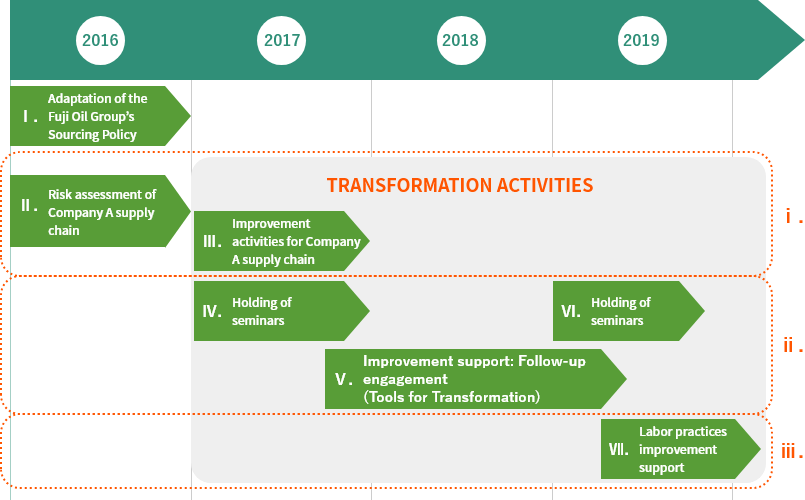
i.Improvement activities with Company A:
On-site inspections of the dealers and plantations related to oil mills, in collaboration with one of the suppliers. The objective was to assess compliance with our Sourcing Policy and to provide support for improvement or corrections. Thanks to this support, in December 2017, passports were returned to more than 200 migrant workers, and 300 migrant workers were able to sign employment contracts in a language that they could understand. This experience is used for “ii. Improvement activities* with suppliers other than Company A,” which will be described later, and is passed on to suppliers other than Company A.
* Refer to the URL below for details of the improvement activities.
https://www.youtube.com/watch?v=sUWBgu07Tp8&feature=youtu.be
ii.Improvement activities with suppliers other than Company A:
We also promote cooperation for improvement with suppliers other than Company A.
We request the palm oil suppliers (oil mills) of Palmaju Edible Oil Sdn. Bhd. (Malaysia) to do a self-assessment using the Tools for Transformation Self-Assessment developed by the Earthworm Foundation. Through this self-assessment, we help identifying gaps between the NDPE* Policy, which includes the requirements in our Responsible Palm Oil Sourcing Policy, and the business practices of the suppliers.
In 2019, we also held a workshop for suppliers for the following purposes. The workshop was attended by a total of 48 suppliers.
- Review of the 2018 results from the Tools for Transformation Self-Assessment
- Dissemination of the Tools for Transformation Self-Assessment to the suppliers of Palmaju Edible Oil Sdn. Bhd. (Malaysia)
- Introduction of the Tools for Transformation Self-Assessment to the new suppliers of Palmaju Edible Oil Sdn. Bhd. (Malaysia) as the second initiative
* NDPE: NDPE stands for No Deforestation, No Peatland development, No Exploitation.
iii.Other engagement activities:
Through the use of the Tools for Transformation Self-Assessment, we recognized the need to strengthen improvement activities, in particular, to improve labor practices and standards. As a result, the Group started supplier engagement visits. We are engaged in the following activities through on-site visits, improvement support, and follow-up visits.
1. Promotion of understanding and capacity building* of the suppliers of Palmaju Edible Oil Sdn. Bhd. (Malaysia) in the following four areas related to laborers and human rights
- Ⅰ. Return of passports
- Ⅱ. Ethical employment
- Ⅲ. Employment contract
- Ⅳ. Grievance mechanism
2. Understanding of good practices and identification of issues in the current operations
3. Provision of support dedicated to each company to improve the identified issues
* Capacity building: Building organizational capacity
② Engagement with suppliers
We believe that engagement with the Group’s direct suppliers is essential to improve the Fuji Oil Group's entire palm oil supply chain. Engagement takes place through the promotion of suppliers' understanding of our Sourcing Policy; followed by discussions about supply chain risks and the grievance mechanism through which concerns can be raised and addressed in the event of problems.
In FY 2019, we distributed questionnaires to all the Group's direct palm oil suppliers (22 refiners) and monitored the progress of each supplier's efforts toward the No Deforestation, No Peatland development, No Exploitation (NDPE) Policy. We will continue to engage with direct suppliers and encourage them to cooperate to reduce risks.
For supply chains with high risks, we implement improvement activities in cooperation with direct suppliers. In FY 2019, we participated, together with direct suppliers, in the two programs of the APT Landscape Initiative in Indonesia, and the Smallholders Support Project in Malaysia.
③ Landscape Approach*
The tracking back to the oil mills revealed in Sumatra, Indonesia, important areas in terms of environment and biodiversity are exposed to deforestation risks. The Fuji Oil Group has participated, since FY 2018, in the Areal Prioritas Transformasi (APT) Landscape Initiative to reduce and repair these risks.
The APT Landscape Initiative*2 is a multi-stakeholder initiative in which local governments, NGOs, companies, and farms, work together to tackle deforestation in the two precious tropical rainforest regions (Aceh Tamiang and southern Aceh). These areas are exposed to the threat of farm development in Indonesia. In these target areas, multi-stakeholders, such as NGOs, communities, and local governments, implement activities to achieve the goals listed below, taking the landscape approach. This approach seeks to improve the entire specific community, not limited to palm plantations.
- Involve local governments as program leaders.
- Create conditions for stopping deforestation within palm plantation areas.
- Prevent deforestation due to palm plantation development outside plantation areas, by providing alternative sources of income to smallholders and strengthening community-based forest conservation.
- Strengthen oil mills' and plantations' current activities in promoting the NDPE policy.
Our activities in 2019 include participating in local meetings, conducting field surveys, forming task forces, and formulating action plans with multiple government agencies and local communities.
The APT Landscape Initiative is currently targeted at three regions of Indonesia's precious tropical rainforests, which are under threat from plantation development. Two of these regions, located in Aceh, are said to be the last areas where orangutans, tigers, elephants, and rhinos coexist.
* Landscape Approach: An approach to improve the entire specific region with the participation of multi-stakeholders, such as NGOs, communities, and local governments, not limited to palm plantations.
*2 Refer to the URL below for details of the APT Landscape Initiative activities.
https://www.earthworm.org/our-work/projects/aceh-tamiang-sumatra-indonesia
④ Activities to support smallholders in Sabah, Malaysia
Inefficient palm plantation operation by some smallholders has been identified as one of the factors causing environmental and human rights problems. In January 2016, the Fuji Oil Group joined a smallholder support project called the Wild Asia Group Scheme (WAGS) to help these farmers gain expertise in environmentally, socially, and economically sustainable plantation management. This project, which was implemented by Wild Asia (an NGO) and our supplier, provided educational support for four years with the aim of improving the productivity and working environment of smallholders in the supply chain of our group.
Since the Fuji Oil Group participated in the WAGS in January 2016, the total number of RSPO-certified farms in the supported regions increased to 191. This corresponds to a total of 58,007 tons of RSPO-certified oil produced by the end of December 2019.
The acquisition of RSPO certificates by smallholders means that they have become able to produce palm oil while respecting human rights and the environment. In addition, we received comments from smallholders as "The amount of pesticide purchased decreased, leading to lower costs" and "Productivity increased, and yield per unit area improved significantly." In FY 2020, we will continue to implement supporting activities, and maintaining close dialogue with local stakeholders.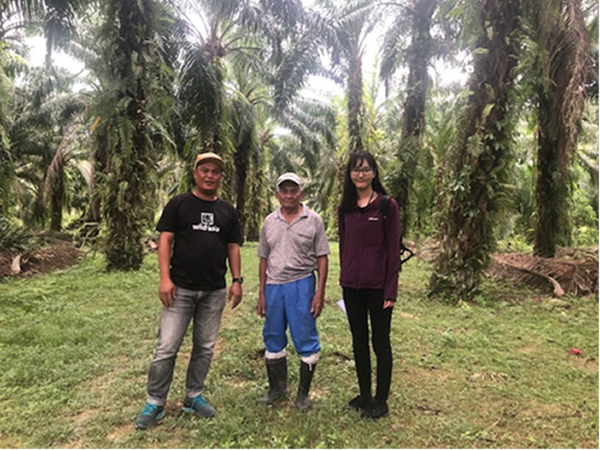
Visit to farmers receiving support in November 2019
© Fuji Oil Holdings Inc.
Establishment of a grievance mechanism
In May 2018, we established and announced a grievance mechanism for processing complaints in order to put our Responsible Palm Oil Sourcing Policy into practice. Our grievance mechanism enables our stakeholders to inform us of any human rights and environmental issues in the supply chain. This allows us to engage directly with suppliers and take appropriate corrective action in accordance with our Responsible Palm Oil Sourcing Policy. The Fuji Oil Group Grievance Web Page (English) on the Group website was launched to offer transparency in handling grievances. The status of our response to the received grievances (complaints) is updated at least once each quarter on the Web Page. We also disclose related information to our stakeholders on this web page.
* Refer to the URL below for details of the grievance mechanism.
https://www.fujioilholdings.com/en/csr/grievance_mechanism/
In FY 2019, we tackled the following two points, using the experience gained from operating the grievance mechanism and feedback from NGOs and suppliers.
① Revision of the grievance procedure
To improve the efficiency and effectiveness of dealing with problems in the supply chain, we revised and announced the grievance procedure mainly from the following perspectives.
<Points of revision>
- If grievance target company is member of a “group”, according to the RSPO member rules, we will engage with it even if it is not part of our supply chain.
- We will introduce a suspension and engagement protocol (procedure for transaction suspension and active engagement) to strengthen our influence on the supply chain, regardless of whether they are direct or indirect suppliers.
- We clarified the processes in each grievance.
② Participation in establishing the "Engagement" and "Remedy" Guidelines
In December 2019, the "Engagement" and "Remedy" Guidelines for Promotion of Responsible Business Conduct and Responsible Supply Chains were established by the Japan Responsible Supply Chains Committee, led by the UN Global Compact Network Japan and the Business and Human Rights Lawyers Network. The Guidelines aim at promoting constructive dialogues between business and society, strengthening grievance mechanisms, and ensuring access to remedies. The Fuji Oil Group also participated in the establishment of the Guidelines.
* Refer to the URL below for details of the "Engagement" and "Remedy" Guidelines for Promotion of Responsible Business Conduct and Responsible Supply Chains.
https://www.bhrlawyers.org/erguidelines
Handling of RSPO-certified oil
The Fuji Oil Group endorses the creation of a sustainable production and consumption system and is member of the RSPO* since 2004.
Demand for RSPO-certified oil is increasing, mainly in Europe and the United States. In 2019, the sales volume of our group's products that use RSPO-certified oil increased to approximately 190,000 tons. This accounts for approximately 24% of the total volume of palm oil handled by the Group. To meet the increasing demand for RSPO-certified oil, we are proactively implementing various measures among Group companies, including the acquisition of supply chain certification at business sites*2.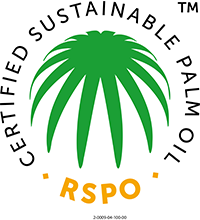
* RSPO: RSPO stands for the Round Table on Sustainable Palm Oil.
*2 Check our progress at
www.rspo.org/
Collaboration with academia, government and industry
① Productivity improvement through breeding research
As palm oil consumption continues to grow globally, regions suitable for cultivation of oil palms remain very limited, requiring productivity and quality to increase through improvements in oil palm varieties and higher yield per unit area. Since 2011, the Fuji Oil Group has conducted joint research to improve palm productivity and quality with the Agency for Assessment and Application of Technology (Badan Pengkajian dan Penerapan Teknologi: BPPT), a government research organization in Indonesia, the world's largest palm oil-producing country. This contributed to the development of palm research in Indonesia, including major improvements in tissue culture techniques that led to the production of superior oil palm seedlings and improved varieties. We intend to keep contributing to the development of the palm oil industry and to the sustainable palm oil production by helping to solve global environmental problems such as tropical rainforest decrease resulting from palm plantations expansion.
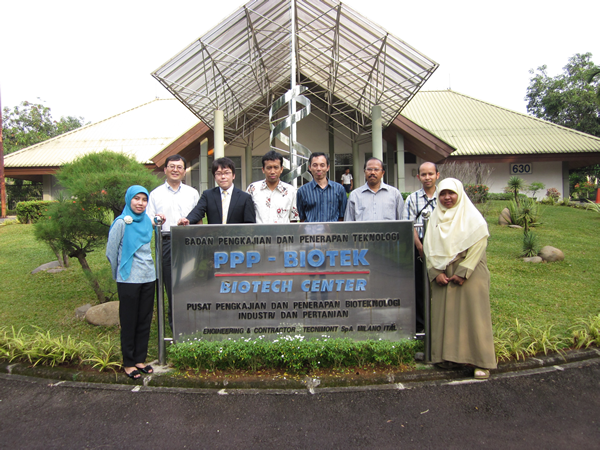
BPPT Biotechnology Center, where breeding research is carried out 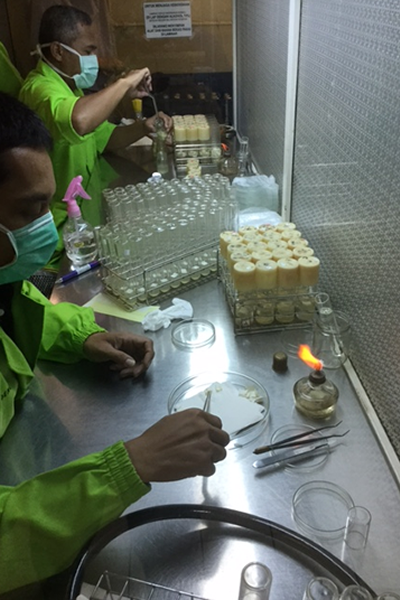
Researching tissue culture of palms
② The Palm Oil Working Group, the Japan Sustainability Local Group of the Consumer Goods Forum
The Fuji Oil Group participates in the Palm Oil Working Group since its inception in FY 2017. The Working Group was set up in the Japan Sustainability Local Group of the Consumer Goods Forum (CGF), an international industry organization for consumer goods.
③ Japan Sustainable Palm Oil Network
Fuji Oil Holdings Inc. has been a full member of the Japan Sustainable Palm Oil Network since FY 2019, in support of its aim of promoting sustainable palm oil procurement and consumption throughout the Japanese industry.
- Topics: Education and awareness-raising activities targeted at children
-
Appealing to consumers and the market is one of the key elements needed to promote sustainable procurement. Education for students who will play a leading role in shaping the future is essential. For this reason we support the “SDGs for School” project* of the NPO Think the Earth, by providing chocolate for on-demand lessons implemented under the project. Through these activities, we work to provide students with the opportunity to consider sustainable palm oil and sustainable society.
* Refer to the URL below for details of the “SDGs for School” project.
